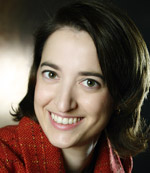The Konrad-Adenauer is the German Christian Democratic foundation, which during the past years spread its activities in the South Caucasus as well. Although it is connected with the Christian-Democratic party it doesn’t depend on the party. And as the head of the South Caucasus office of the Konrad-Adenauer foundation Katja Christina Plate says it is not a party but a political foundation, the purpose of which is to support the expansion of democratic values.
– The Konrad-Adenauer foundation started its activity in the region in January 2008. We have offices in Yerevan, Tbilisi and Baku. In South Caucasus we work in 4 main sectors. The first one is cooperation with the counterpart political party. The second sector includes work with mass media. We work in the direction of providing methodic knowledge on media management, examination of the legislative field. The third sector is the social-market economy, which is one of the key issues in Europe. In this sector we are cooperating with universities, introduce to them the models of social-market economy and give them information on this system. We have originally launched this program in Georgia and we implement it in the regions and not the capital city. We are trying to contribute to the development of economy in the regions. The next sector of our activity is the regional cooperation – the policy of security (we are trying to create dialog between the three states) and cooperation among religious communities.
– What projects does your foundation have in the near future, which can bring tangible results?
– Besides the abovementioned activities we also have a special program. Since September 1 of 2009 we are implementing a project in cooperation with the European Union and it is planned to spend 1.8 million Euro on that. This is a project on political education and will be taught in schools. And as the political education is the benchmark of our foundation this project very much suits our goals. We will be working with teachers, pupils and schools located in the marzes and not Yerevan.
– And who are your partners in Armenia?
– In each country we select partner organizations when planning our activities. In Armenia our first partner is the Yerevan School of Political Sessions of the Council of Europe, which should implement the whole program. And the next partner is the ministry of education and science of Armenia. We are currently in a very successful and fertile phase because cooperation with these partners is very successful. Now we are basically busy with organizational and logistical issues. We are first forming our office, which should serve the implementation of the program; we are seeking experts, who will be willing to participate in this program. I think that the first results of this program will be seen in September 2010.
– It means the basis of this program is the schools by providing political knowledge and spreading political culture.
– Yes, this is exactly our goal. In the marzes there are difficulties in receiving information and specifically related to democracy. It is difficult for people to get information on what’s democracy. In Yerevan there are numerous such opportunities but in the regions it is quite abstruse. The practice of our foundation shows that the political knowledge is not when they know how many MPs there are in the parliament or mere knowledge on state structures. Democracy is what you feel on daily routine.
– How are you going to implement this program in schools in practice?
– Now we are developing the methodology. Those are the methods, which should be first of all delivered to the teachers so that the latter would pass those on to the pupils. One of the methods, for instance, works very efficiently. It is the conduct of games. After this we will conduct qualification lessons in schools. After the qualification the pupils will write a paper, where they’d present the priorities of their communities, the issues and barriers that exist. It means that every pupil will learn not only to receive information but also pass it on by forming his/her own opinion. After this phase the pupils will elect a representative from among themselves and the representative will be sent to the South Caucasus parliament, where the representatives of the rest of the two countries will be represented from Georgia and Azerbaijan. The representatives of the three countries, who will already have their political documents, will develop a joint document-convention, which should depict the interests of South Caucasus. Inside this parliament it will be possible to teach the pupils how to form coalitions, methods of compromising and techniques of mutual understanding. And when this joint document is ready a group of children will leave for Brussels, where they will present this project to the European Parliament or the chair of the European Commission. Our funds are enough to implement this program for three years and we hope that we will be able to continue implementing this for three more years because in our opinion this is a great opportunity to give political education to the young generation.

